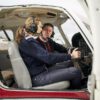The Federal Aviation Administration’s (FAA) medical certification process for pilots covers the requirements, methods, and typical problems that applicants face. To maintain aviation safety, the FAA regulates airman medical certification under Federal Aviation Regulations (FAR) Part 67 which establishes minimal requirements for pilots’ physical and mental well-being.
Medical Certification Classes
Depending on the type of pilot training to do, the FAA grants three different classes of medical certificates:
- First Class: For pilots handling major scheduled airlines, a requirement for Airline Transport Pilots (ATP). Stricter medical requirements, such as vision tests for 20/20 distance vision and the absence of serious cardiovascular disorders, are necessary.
- Second Class: To hold a Commercial Pilot License to fly for hire, transport freight, and crop dusting, among other duties, 20/20 vision and adherence to certain health standards are prerequisites for this class.
- Third Class: For students and private pilots taking leisure flights. It is much less demanding than First or Second Class, with lower thresholds for additional medical requirements, including a 20/40 eyesight requirement.

Crucial Medical Guidelines
- Vision: There are distant vision, near vision, and intermediate vision examinations which are different in the three medical classes. Although corrective glasses are permitted, 20/20 vision is necessary for First and Second Class certifications. 20/40 eyesight is required for Third Class. The capacity to differentiate colors that are essential for flying is the only need for the new color vision requirements, but it is also different in the classes.
- Hearing: The regulations of hearing are the same in the three classes, based on FAR 67.105, 67.205, and 67.305. At a distance of six feet, pilots must be able to hear normal speech. Severe balance issues or vertigo can be a disqualifying reason.
- Mental Health: Conditions like severe personality disorders, psychosis, or drug/alcohol abuse can lead to disqualification. Certain conditions may be reevaluated by FAA criteria following verified treatment and recovery. In the three medical classes, these rules are the same for mental health, which you can read about in FAR 67.107, 67.207, and 67.307.
- Neurologic: Pilots with epilepsy, a history of seizures, or an inexplicable loss of consciousness are prohibited from flying unless they have been symptom-free for a considerable amount of time. After one to two years of assessment, recovery from strokes and transient ischemic attacks (TIAs) can be reexamined.
- Cardiovascular Health: Comprehensive medical evaluations are necessary for heart disease and associated conditions such as heart attacks, bypass surgery, or valve replacements. Pilots over 35 must provide an electrocardiogram (ECG) annually after age 40.

Special Certificates of Issuance
The FAA provides a “special issuance” certificate for pilots with medical histories that would disqualify them. As long as they fulfill certain follow-up medical standards, pilots with significant diseases like diabetes, heart disease, or other conditions can fly with this permit. Special issuances have expiration dates (usually 12 months) and require further testing to be renewed. Despite initially disqualifying criteria, more than 25,000 pilots—including 1,100 first-class pilots—have been certified under special issuance.
Prescription Drugs and Exclusions
Numerous drugs are ineligible, particularly those that affect the central nervous system (such as sedatives, tranquilizers, and antidepressants). Another worry is over-the-counter medications such as antihistamines that can make you drowsy. Before flying, pilots are recommended to review FAA-approved prescription recommendations. The FAA may reevaluate certification if the medicine that disqualifies is stopped and the underlying issue is addressed.
For further information, visit the FAA’s website.













